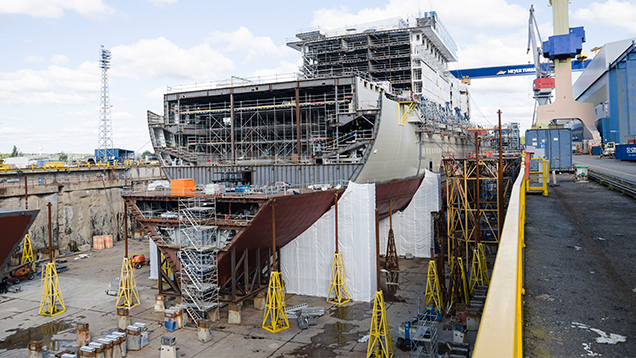TEM-Meri project: Finnish maritime cluster moves towards the 2020s boosted by bold innovations and value networks

The Finnish maritime cluster is a diverse complex that includes a broad range of companies, which, in turn, have expertise, resources and business activities in very different environments and markets. The cluster operates in an extremely international environment and is continuously faced with direct global competition.
However, developments over the past few years have proven that the Finnish maritime cluster is robust and viable: even during difficult times, the companies in the cluster have demonstrated an ability to transform and reinvent themselves in their markets and have focused on building international connections. Operating in multiple markets is one of the maritime cluster’s strengths since it helps companies remain stable despite economic fluctuations. A recent study on the maritime cluster outlines the different industries and groups of companies whose business activities are based on shipping and marine resources.
The results are presented in the report The Finnish maritime cluster: towards the 2020s, which is part of a programme run by the Ministry of Economic Affairs and Employment to develop the marine industry environment (TEM-Meri programme). The study was coordinated and funded by the Finnish Maritime Society together with other operators in the sector. The research was carried out at the University of Turku, by the Brahea Centre and Turku School of Economics.
In 2014, the total turnover of all activities associated with the maritime sector was approximately EUR 12.7 billion (the survey included 1,500 Finnish limited companies operating in the maritime cluster). Finnish companies alone employed 48,400 people in activities directly associated with the maritime sector. Companies belonging to the Finnish maritime cluster mostly operate in six main market segments: freight transport, cruise traffic, car ferry and ro-ro traffic, offshore oil and gas production, offshore renewable energy production, and public demand. Based on the group of companies examined, the added value created by the whole maritime cluster was estimated at EUR 3.8 billion.
Several future opportunities have been identified for the maritime cluster. These include specialising in Arctic know-how, battery technology and hybrid energy solutions. Novel phenomena could be identified and surprising changes take place, for example, in high-added-value products connected to the marine bioeconomy, industrial symbioses or the innovative combination of production and service chains.
“Digitalisation is increasing in all branches and activities of the maritime cluster from ship building to operating vessels and handling cargo, and it creates new business opportunities. The increasing importance of the IT sector is a cross-cutting trend in the maritime cluster,” says Senior Researcher Tapio Karvonen from the University of Turku.
“Promoting digitalisation is one of the key projects included in the Government Programme. It also plays an important role in boosting the competitiveness of the Finnish maritime cluster. The creation of the autonomous maritime ecosystem shows that we have the courage to implement demanding future projects,” says Minister of Economic Affairs Olli Rehn. The new ecosystem brings together global forerunners and agile start-ups to develop the world’s first autonomous shipping solution. The efforts are supported by the Arctic Seas programme run by the Finnish Funding Agency for Innovation Tekes and by the research expertise of Finnish universities and VTT Technical Research Centre of Finland Ltd.
“The most important future challenges of the maritime cluster include securing access to finance and skilled labour. Maintaining price competitiveness, profitability and the current conditions of competition are other key issues in the intense international competition, particularly in the field of shipping,” says Mikko Niini, chairman of the Finnish Maritime Society. “It is great that a new study was conducted on the maritime cluster, since the previous one was already ten years old. The data should be updated more frequently,” Niini adds.
At present, the Finnish maritime cluster is stimulated by the marine industry, where the cruise ship and passenger-cargo ship markets are creating jobs in Finnish companies. Offshore, cargo vessel and tanker markets are declining, which has an impact on large Finnish technology suppliers. Stringent environmental regulations mean that customers are now shopping for green vessels, increasing the demand for Finnish technology, digital know-how and experts. In the future, software will play an increasingly important role in shipping and shipbuilding because it is one of the solutions to making ships more environmentally friendly.
“The maritime cluster sets an example to other fields, showing how the ecosystem model can be used to reform a sector in a way that benefits all operators. In an ecosystem, competitors engage in open-minded collaboration, which provides Finnish companies with a competitive advantage and creates high-skilled jobs,” says Director-General Ilona Lundström from the Ministry of Economic Affairs and Employment. Lundström would like to thank the Ministry of Transport and Communications for their strong collaboration in creating the maritime ecosystem.
For further information, please see the publication The Finnish maritime cluster: towards the 2020s at www.tem.fi/julkaisut and the news piece published by Tekes at https://www.tekes.fi/en/whats-going-on/news-2016/autonomous-maritime-ecosystem-starts-in-finland/.
Inquiries:
Mikko Niini, Chairman, Finnish Maritime Society, tel. +358 400 322 747
Tapio Karvonen, Senior Researcher, University of Turku, tel. +358 40 779 9482
Janne Peltola, Ministerial Adviser, Ministry of Economic Affairs and Employment, tel. +358 50 396 0142